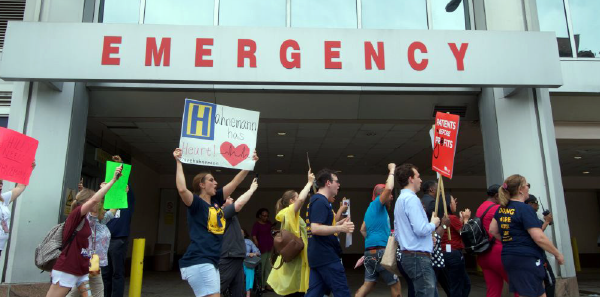
After months of speculation, residents at Drexel University/Hahnemann University Hospital learned in July that, as of July 29, 2019, they have to finish their residencies elsewhere.
On June 26, 2019, the California-based investment firm that owned the Philadelphia hospital filed for bankruptcy and abruptly announced the hospital would close. The question was, when?
In the weeks after notice of the impending closure, residents were left with no shortage of uncertainty. In mid-July, Matt Abrishamian, MD, didn’t know whether he would need to move by the end of the month. Or maybe it would be early September. He didn’t know for certain whether, or when, the funding he had as a resident would travel with him as he sought out a new program to complete his third and final year. He didn’t know if he would be licensed in time to train in a new state. Dr. Abrishamian was looking into transferring to an emergency medicine program at the University of California, Irvine.
“This is uncharted territory, and there is a lot of uncertainty,” said Dr. Abrishamian. “You don’t want any gaps in your training because it can affect your licensing and getting through boards. It’s been a lot of waiting and unclear answers, mainly because something like this hasn’t happened at this magnitude and size.”
Search for Information and Answers
According to The Philadelphia Inquirer, in a Philadelphia Court of Common Pleas lawsuit against Hahnemann and its owners, Drexel University called the closure “the largest orphaning of medical residents in the history of the United States.”1
There are 570 residents currently employed at Hahnemann, and 45 of them are in emergency medicine.
Some foreign medical residents on J-1 visas could face deportation if they fail to secure new accredited residency positions within 30 days of the hospital’s closure.2 The hospital’s owners—American Academic Health System LLC (AAHS), an affiliate of Paladin Healthcare—announced Hahnemann would close on Sept. 6, 2019, though as of July 16, its plan had not yet been approved.
The signs were there for months, said third-year emergency medicine resident Liz Calhoun, MD. “They’ve been cutting corners where they could—the quality of supplies has decreased, they stopped repairing elevators and buildings,” Dr. Calhoun said. “There’s been evidence that it’s been on rapid decline.”
In April 2019, Hahnemann’s financial troubles became apparent when owners cut 175 jobs. According to the Inquirer, the company sent letters to incoming residents to assure them their positions were not in jeopardy.
Pages: 1 2 3 4 | Single Page




No Responses to “Philly Hospital’s Unexpected Closure Leaves Residents Scrambling”